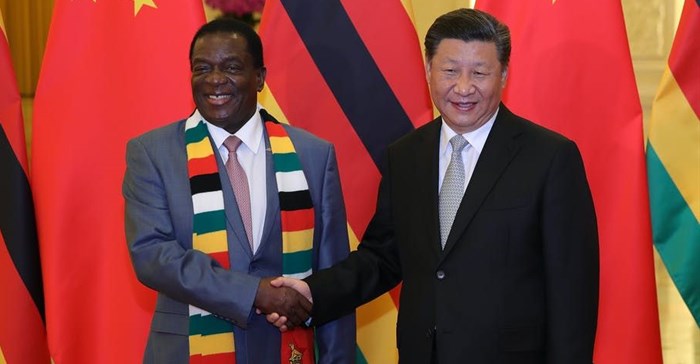






As he stated
We look forward to playing a positive and constructive role as a free, democratic, transparent and responsible member of the family of nations.International expectations (more so than those among local people) looked forward to translating these promises into policy. This was despite the fact that Mugabe’s departure had been anything but democratic.
But there have been few if any changes in Zimbabwe’s political trajectory. A deepening economic crisis combined with a brutal crackdown on the government’s domestic opponents has resulted in disappointments.
On the foreign policy front Mnangagwa has fared no better. In a recently published analysis we examine the status of Zimbabwe’s foreign policy. We identify what’s gone wrong in its efforts at rapprochement with Western countries in a bid to get sanctions lifted, and why its efforts at cosying up to China haven’t gone to plan either.
We conclude that Mnangagwa’s hopes of reorienting Zimbabwe’s foreign policy have been confounded by his government’s own actions. Its repressive response to mounting economic and political crisis increased rather than diminished its isolation. The more the Mnangagwa government fails to engage democratically with its own citizens, the more it will negate any prospect of re-engagement.
Since the Mugabe era the African Union and Southern African Development Community (SADC) have been tolerant of the Zanu-PF regime’s politics.
SADC’s annual summit in 2019 demanded an end to western sanctions.
But the continued repressive nature of Mnangagwa’s regime is not making this loyalty easy.
Tensions have begun to show. In August 2020, South Africa dispatched official envoys to Harare to press for restraint on the Mnangagwa government in its actions against opposition figures. The envoys weren’t greeted warmly. Instead they were subjected to a presidential harangue and denied the opportunity to meet the opposition.
A subsequent mission by South Africa’s governing party the African National Congress (ANC), acting as a fellow liberation movement, was as shoddily treated.
South Africa’s patience may be wearing thin. But, for its part, the Southern African Development Community has preferred to officially ignore developments by remaining silent. But while “business as usual” translates into continued political loyalty, it does not translate into increased economic collaboration.
Two decades ago the US and European Union imposed sanctions on those linked to the government in response to human rights abuses. Mugabe’s regime reacted by blaming its economic woes on the West. Mnangagwa decried sanctions as western attempts to bring about “regime change”.
Unimpressed by the rhetoric, the US extended restrictive measures against targeted individuals and companies in August 2018. In March 2019, US sanctions were renewed.
In contrast, the EU demonstrated more willingness to reengage with Harare. In October 2019 the EU announced an aid package, bringing support during the year to €67.5m. Aid to Zimbabwe since 2014 stood at €287 million in 2020. This made the EU Zimbabwe’s biggest donor. To ease the woes of the Covid-19 pandemic, it added another €14.2m humanitarian assistance in 2020.
Mnangagwa, however, continued to blame the West for sanctions he compared with cancer. Responding to criticism the EU declared
Zimbabwe is not where it is because of the so-called sanctions, but years of mismanagement of the economy and corruption
US Senate Foreign Relations Committee chair Jim Risch called upon the Southern African Development Community’s 16 members states to
focus their energies on supporting democracy, not kleptocratic regimes.
The deterioration of Zimbabwe’s relations with the West coincided with growing Chinese interest in access to African resources for its own rapidly expanding industries. Zimbabwe’s growing isolation offered a convenient entry point.
But, China’s greater involvement was spurred less by solidarity than by self-interest. And it’s singular importance in throwing a life-line to the Zimbabwean regime in need gave it enormous influence in directing the collaboration. Failure to mend relations with the west and other global institutions leaves Zimbabwe with no other partners for development and cooperation, thus vulnerable to manipulation by China.
An initial honeymoon started at the turn of the century, after Zimbabwe became isolated from the West through its fast-track land reform of 2000, and the increased repression of the political opposition. But China became increasingly concerned about Mugabe’s indigenisation policy. With Chinese companies the largest foreign direct investors, the announced enforcement of the 51% Zimbabwean ownership in assets exceeding US$ 500,000 from April 2016 caused discomfort.
Mnangagwa’s elevation to the presidency may have received China’s blessing as the best option available. Nonetheless, strains soon appeared. When it became increasingly apparent that Zimbabwe was unable to service its debts, China wrote off some of the liabilities in 2018.
What particularly rankled Beijing was that Harare’s incapacity to pay its debts was deemed to be due to the government’s misappropriation or misuse of Chinese funds. Accordingly, there was need to tighten controls. This culminated in the signing of a currency swap deal in January 2020.
Back in mid-2019 China’s embassy in Harare had already stressed that development relied mainly on a country’s own efforts. It expressed hope that the Zimbabwean side would continue to create a more favourable environment for all foreign direct investment, including Chinese enterprises.
Indications suggest that China’s patience with the ailing Zimbabwean “all weather friend” is wearing thinner. The new economic challenges following the Covid-19 pandemic might have shifted priorities in global supply chains. This is also affecting the Belt and Road Initiative, China’s massive global infrastructure project. This might reduce interest in what Zimbabwe has to offer by way of natural resources.
Zimbabwean foreign policy remains locked in the parameters of recent times past: looking to regional solidarity, estranged from the West, and increasingly dependent on China.
Yet China has its own very clearly defined interests. These focus on resource extraction in mining and agriculture for its own domestic economy. As a strategic and developmental partner, Zimbabwe is of minor interest.
Chinese-Zimbabwean relations serve an elite in the Zanu-PF government. They are accused of “asset stripping”. They exclude any oversight, civil society involvement, and lack transparency and accountability. The absence of visible benefits for ordinary Zimbabweans has engendered anti-Chinese sentiments.
Having failed to restore friendly relations with the West, and its “look east policy” not bearing fruits, has left the Mnangagwa regime with few options. Russia has entered the arena, showing increased interest in the extractive industries, arms trade and political fraternisation.
This sounds not much like an alternative to the current ties with China. The bedfellows remain more than less of the same. And an old adage comes to mind: with friends like these one does not need enemies.
This article is republished from The Conversation under a Creative Commons license. Read the original article.![]()

The Conversation Africa is an independent source of news and views from the academic and research community. Its aim is to promote better understanding of current affairs and complex issues, and allow for a better quality of public discourse and conversation.
Go to: https://theconversation.com/africa